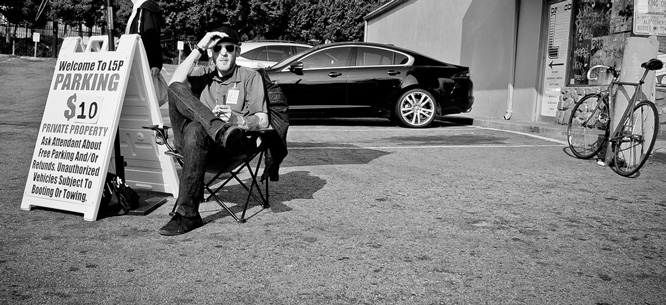The Counterculture Looks for Parking
The Counterculture Looks for Parking

Nothing, it seems, says anti-establishment these days like the demand for a cheap place to park your car.
New York’s last bohemian, the Times tells us, flees a city ruined by gentrification. High on “outlaw artist” Clayton Patterson’s list of complaints, right after luxury apartments and chain stores, comes overpriced parking meters.
Washington decides not to widen the sidewalk on a commercial strip when older neighbors, accustomed to driving a few blocks to the stores, decry the loss of parking. The activists cite their anti-establishment credentials: “We were smoking marijuana illegally long before they were a gleam in their parents’ eye,” one says of the wider sidewalk’s proponents.
Across the continent in Santa Monica, activists who dread five-story apartment buildings welcome plans for a seven-story parking garage. Built with solar panels on the roof, it is hailed as an “enviro-conscious” structure.
There was a time when dissidence marched on foot. On the first Earth Day in 1970, demonstrators burned cars. The protest singer Joni Mitchell lamented that year that “they paved paradise and put up a parking lot.” So what brought the counterculture from “off the pig” to off-price parking?
A clue is buried in the lyrics of another folk musician. A few years before Joni Mitchell came on the scene, Malvina Reynolds drove through the San Francisco suburb of Daly City and saw houses that all looked just the same. In her 1962 single “Little Boxes,” those homes “made of ticky-tacky” stood for the suburban conformism of doctors, lawyers, and business executives. Cultural revolt struck a blow against an economic system based on mass production. Assembly-line housing was a symbol of this power structure.
But since then manufacturing has ceased to dominate the U.S. business world. Branding is the new basis of corporate strategy, and making images (and not just things) has become a source of profit. Brands aim, above all, to be different from what everyone else sells, so cultural contestation starts to merge with marketing, despite the fact that going into advertising was once the ultimate sellout.
As the sixties fade into the distant past, the counterculture comes ever closer to the corporate world. The automobile is no longer disdained, and the downtown quest for novelty pairs off with the suburban search for a parking space. Fear of apartment towers and their tenants’ cars, long prevalent in sleepy residential towns, grips pulsing urban neighborhoods. This disdain for the humdrum and uninspired often amounts to little more than plain old snobbery. The ex-New Yorker profiled in the Times is trading the Lower East Side for an Alpine spa favored by Habsburg emperors.
The cultural critique of conformism has mutated, all too often, into empty display. “Little Boxes” can now be heard as a complaint about houses. The ticky-tacky isn’t even their worst feature. The real problem is that there’s no place to park out front.
Benjamin Ross is a transit activist in Maryland. His new book, Dead End, is about the politics of urbanism and transit.






